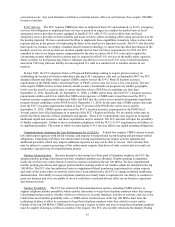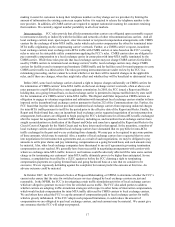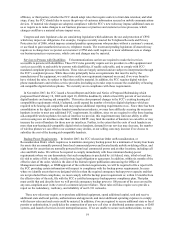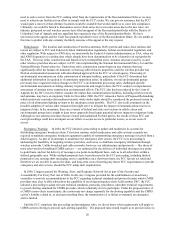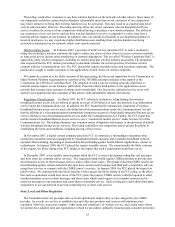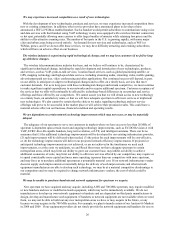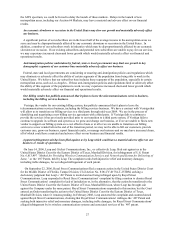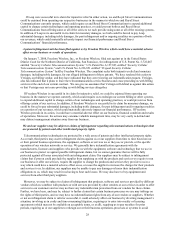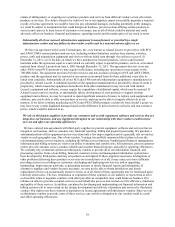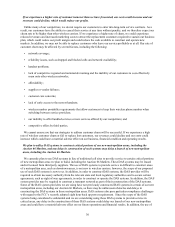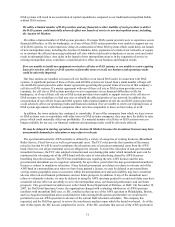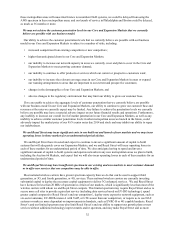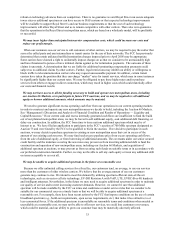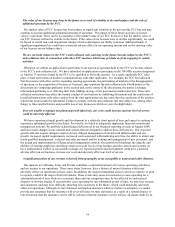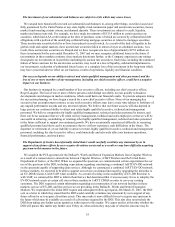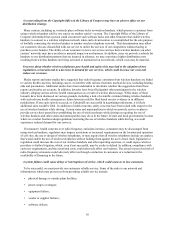Metro PCS 2007 Annual Report Download - page 37
Download and view the complete annual report
Please find page 37 of the 2007 Metro PCS annual report below. You can navigate through the pages in the report by either clicking on the pages listed below, or by using the keyword search tool below to find specific information within the annual report.26
We may experience increased competition as a result of new technologies.
With the development of new technologies, products and services, we may experience increased competition from
new or existing competitors. In addition, other service providers have announced plans to develop or have
announced a WiFi or WiMax enabled handset. Such a handset would permit subscribers to communicate using voice
and data services with their handset using VoIP technology in any area equipped with a wireless Internet connection,
or hot spot, potentially allowing more carriers to offer larger bundles of minutes while retaining low prices and the
ability to offer attractive roaming rates. The number of hot spots in the U.S. is growing rapidly, with some major
cities and urban areas being covered entirely. As demand for new services and technologies, such as WiFi or
WiMax, grows, and if we do not offer these services, we may have difficulty attracting and retaining subscribers,
which will have an adverse effect on our business.
The wireless industry is experiencing rapid technological change, and we may lose customers if we fail to keep
up with these changes.
The wireless telecommunications industry has been, and we believe will continue to be, characterized by
significant technological change, including the rapid development and introduction of new technologies, products,
and services, such as VoIP, push-to-talk services, location based services, such as global positioning satellite, or
GPS, mapping technology and high speed data services, including streaming audio, streaming video, mobile gaming,
advertisement paid services, video conferencing and other applications. Our continued success will depend, in part,
on our ability to anticipate or adapt to technological changes and to offer, on a timely basis, services that meet
customer demands. For us to keep pace with these technological changes and remain competitive, we must continue
to make significant capital expenditures to our networks and/or acquire additional spectrum. Customer acceptance of
the services that we offer will continually be affected by technology-based differences in our product and service
offerings and those offered by our competitors. We cannot assure you that we will obtain access to new technology
on a timely basis, on satisfactory terms, or that we will have adequate spectrum to offer new services or implement
new technologies. We also cannot be certain that the choices we make regarding technology and new service
offerings will prove to be successful in the market place or will achieve their promised results. This could have a
material adverse effect on our business, financial condition and operating results.
We are dependent on certain network technology improvements which may not occur, or may be materially
delayed.
The adequacy of our spectrum to serve our customers in markets where we have access to less than 20 MHz of
spectrum is dependent upon certain recent and ongoing technology improvements, such as EV-DO Revision A with
VoIP, EVRC-B or 4G capable handsets, long term evolution, or LTE, and intelligent antennas. There can be no
assurance that (1) the additional technology improvements will be developed by our existing infrastructure provider,
(2) such improvements will be delivered when needed, (3) the prices for such improvements will be cost-effective,
or (4) the technology improvements will deliver our projected network efficiency improvements. If projected or
anticipated technology improvements are not achieved, or are not achieved in the timeframes we need such
improvements, or at the costs we anticipate, we and Royal Street may not have adequate spectrum in certain
metropolitan areas, which may limit our ability to grow our customer base, may inhibit our ability to achieve
additional economies of scale, may limit our ability to offer new services offered by our competitors, may require us
to spend considerably more capital and incur more operating expenses than our competitors with more spectrum,
and may force us to purchase additional spectrum at a potentially material cost. If our network infrastructure vendor
does not supply such improvements or materially delays the delivery of such improvements and other network
equipment manufacturers are able to develop such technology, we may be at a material competitive disadvantage to
our competitors and we may be required to change network infrastructure vendors, the cost of which could be
material.
We may be unable to purchase handsets and network equipment for spectrum we acquire.
New spectrum we have acquired and may acquire, including AWS and 700 MHz spectrum, may require modified
or new handsets and new or modified network equipment, which may not be immediately available. We do not
manufacture or develop our own network equipment or handsets and are dependent on third party manufacturers to
design, develop and manufacture such equipment. If handsets or network equipment are not available when we need
them, we may not be able to build out any new metropolitan areas we have or may acquire in the future, or any
licenses we may acquire in the 700 MHz auction. For example, we plan to launch certain of our Auction 66 Markets
in 2008 and 2009. If our equipment providers do not timely provide the network equipment and handsets for use on


